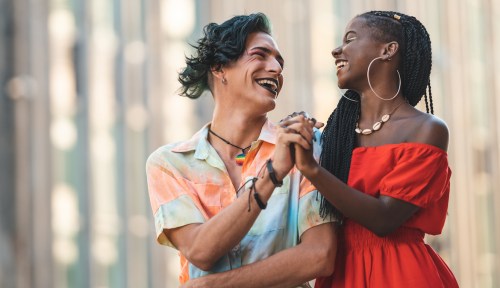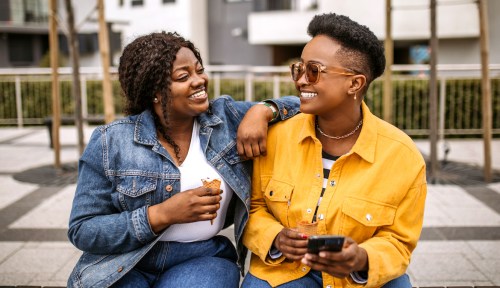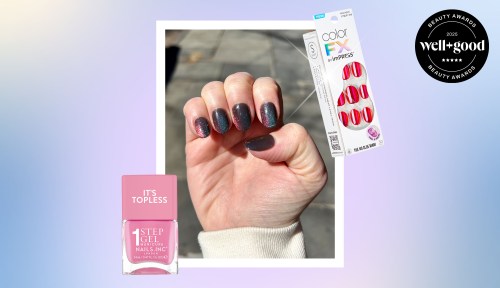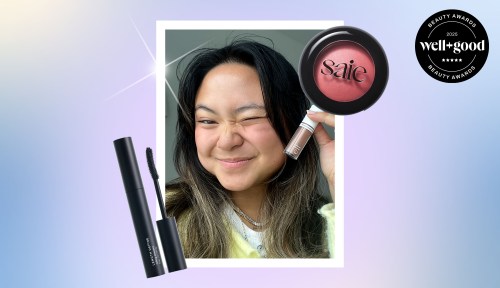“I’ve found my soulmate!” When you hear someone say this, what type of relationship comes to mind: a romantic partner or a friendship? If you’re like most people, you likely assume that the person is describing a romantic relationship because society tends to prioritize a head-over-heels romance over friendship, even those that are profoundly close and personal. But what is the real difference between friendship and a romantic relationship, and are the two more similar than we think? In a society that hails marriage, children, and romance as the highest forms of love and success, we tend to push platonic relationships aside to make way for romantic expressions of love. According to experts, though, friendship has the potential to be far more valuable than romance depending on the relationship.
Experts in This Article
Of course, not all friendships feel the same—while some may function more like acquaintanceships, others run much deeper. You may not feel romantic feelings for your close friends, but the emotions you do experience around them may admittedly feel similar, like a deep platonic love. Though it may surprise you, this is completely normal, especially given that the differences between friendship and a romantic relationship aren’t as stark as you might think. Compared to just a decade ago, in fact, we have a whole new vocabulary of terms—such as “platonic soulmate” and “platonic love”—to describe these types of intimate friendships. Additionally, queer friendships can blur the lines when it comes to having deep, intimate connections with people of the same or opposite gender. Not to mention, conversations about friendship have become more nuanced, leaving room to discuss platonic heartbreak, co-dependent behavior, and even “love-bombing,” patterns and behaviors typically associated with romantic relationships.
“Research acknowledges the difficulty in defining a romantic relationship. There is a lot of gray area: non-traditional relationship structures, friends with benefits, casual relationships, etc.,” says Gabrielle Morse, LMHC, a psychotherapist. It becomes even more difficult to discern between these gray areas when romantic relationships start as friendships first, or when couples refer to their romantic partner as their best friend. Ahead, relationship experts explain the difference between friendship and a romantic relationship, and weigh in on which kind of relationship you should prioritize above all else.
What is the difference between friends and lovers?
Trying to distinguish between friends and lovers isn’t as black-and-white as expected. Thankfully, there are a few factors experts recommend honing in on to potentially explain the differences between friendship and a romantic relationship.
1. Feelings/emotions
Some people might shrug and say that the clear difference between friendship and a romantic relationship is the romance, but it’s not that simple. In some cases, we may consider specific actions romantic coming from one person and platonic coming from another—such as going out to dinner with a friend instead of a date or receiving flowers from your best friend instead of your romantic partner. While these actions on their own are neutral, we often assign specific meanings based on who they come from. Experiencing romantic feelings for a person can turn a simple gesture into something more significant, notably if you are looking for signs that they feel the same in return. Meanwhile, signs of platonic love may include enjoying their company, being vulnerable with them, sharing interests and goals, and feeling supported (and supporting others) through difficult experiences.
2. Physical/sexual connection
For some, the primary principle that separates lovers and close friendships is sexual attraction. “One distinction between friends and lovers is the presence of physical attraction and physical intimacy,” says Morse. If sex is on the table, we often expect the connection to be more romantic than platonic. While this may be the case for some, for others it isn’t always that simple. “Even these differences can sometimes be turned on their heads,” says Saba Harouni Lurie, a licensed marriage and family therapist and owner/founder of Take Root Therapy. “There are certainly friendships that include sexual or romantic elements (think ‘friends with benefits’), and there are marriages and romantic relationships that are satisfying and companionate and may not include or prioritize sexual or physical intimacy [such as those who have health issues that make physical intimacy difficult or those who identify as asexual].”
“While strong, intimate, long-term friendships may share commonalities with romantic partnerships, many people observe different boundaries in their friendships versus romantic relationships.” —Saba Harouni Lurie, LMFT
With that in mind, communication is essential regardless of the definition of the relationship. If you are someone who only has sex with people you are romantically interested in, but the other person is comfortable engaging in sex with friends, you’ll want to ensure you’re on the same page.
3. Intimacy
Intimate friendships and romantic relationships overlap in essential ways. According to Morse, however, the types of intimacy involved in these relationships may differ depending on the individual connections. “Research has highlighted different types of romantic love: passionate (infatuation, erotic, romantic) and companionate (less intense, but there’s trust, closeness—more like a friendship),” says Morse. Depending on the person, some people may benefit more from passionate love while others may find companionate love more valuable.
4. Exclusivity
According to Lurie, it’s relatively common for people to expect monogamy or some form of exclusivity from their romantic partners. In platonic relationships, however, we don’t typically have the same restrictions; even if we’re close friends with someone, we assume they have other friends. Because romantic relationships are more exclusive, this often pushes us to believe that our romantic partners are more devoted to us than our platonic partners. However, platonic connections can be as deeply committed as romantic ones depending on the people involved.
Additionally, non-monogamous people, such as those in polyamorous relationships, challenge the necessity of exclusivity at all. Someone who is non-monogamous may have multiple romantic partners that aren’t exclusive, as well as intimate friendships—all of which provide deep, fulfilling, committed relationships. Those in open relationships may have one romantic partner with whom they share romantic and companion intimacy while having other connections that are solely sexual but not romantic.
5. Relationship expectations
Another factor that may differentiate friends from lovers is the amount of time and energy invested into these relationships. In romantic relationships, we’re frequently expected to give our partners more attention and spend more time with them than with our friends, but the reverse is rarely true. “While strong, intimate, long-term friendships may share commonalities with romantic partnerships, many people observe different boundaries in their friendships versus romantic relationships,” says Lurie. “These boundaries include frequency of contact, shared responsibilities, and long-term commitments….[among other factors].”
We may be tempted to focus more of our energy on romantic relationships with the expectation that friendships can be placed on the back burner without much effort to keep them going. However, Morse says this isn’t really the case. “Both romantic relationships and friendships require active care and attention to thrive and feel fulfilling,” Morse says. “We tend to focus on the idea of happy romantic relationships, often minimizing the effort and work needed to maintain deep friendships. There is cultural messaging around the belief that ‘friendships should be easy,’ which isn’t true—meaningful connections require work.” Defining your friendship expectations—rather than assuming that romantic connections automatically get more time, attention, and energy—can help strengthen your friendships.
6. Future planning and life goals
For some, the traditional litmus test that determines whether you’re friends or lovers with someone is whether you’d buy a house or start a family with them. If the answer to either question is yes, the relationship may lean more toward romantic than platonic, as supported by the Gottman Method of Couples Therapy concept called “Creating Shared Meaning.” The theory posits that couples intentionally work to build lives full of meaning by deciding how they move through time, tell stories, share their family culture and beliefs, and shape their legacy together. While this concept holds true for some, there are several exceptions to this rule, including stories about friends who buy houses together, platonic friends who get married, or friends who provide surrogacy or enter parental agreements to raise children together. So, whether or not you’d settle down with someone may be an indication that your relationship is romantic, but intimate friendships can still play a significant role in creating a fulfilling life in new ways.
Why are romantic relationships so important?
“For many of us, romantic relationships represent the pinnacle of connection,” says Lurie. “Romantic relationships have traditionally been given more significance due to cultural norms and expectations around marriage, family, and partnership . . . [People] may pursue romantic relationships to pursue parenthood and a family, and in numerous cultures, romantic relationships are established as a critical part of adult life and societal expectations.” According to Morse, romantic relationships also have a noticeable impact on our well-being. “They boost our sense of belonging, and self-esteem, provide safety and security, help you feel understood, prevent against social isolation/ loneliness, emotional support, and opportunity to care for somebody,” Morse says. So, from our personal development to achieving our long-term goals, romantic relationships play a major part in determining our overall happiness.

Why are intimate friendships so important?
Intimate friendships are usually marked by a deep sense of closeness shared between individuals. These are typically the friends we confide in and turn to for comfort and support through difficult moments, and they are considered highly important people in our lives. “Given our need for connection, intimate friendships are meaningful because they can offer us great care and understanding,” Lurie says. “Friendships can offer stable, supportive ties that can withstand many tests and transitions.” Research supports the idea1 that intimate friendships are linked to higher self-esteem and that both romantic and platonic relationships contribute to a person’s well-being. “[Intimate friendships are important] for all of the same reasons!” Morse insists. “[They provide] belonging, identity, self-esteem, sense of support and community, feeling understood, fulfillment, meaning, and purpose. Meaningful friendships are just as impactful and life-changing as romantic relationships.”
“Friendships offer emotional connection, support, understanding, and belonging, which are invaluable, especially when we don’t gain these things from our romantic and familial relationships.” —Saba Harouni Lurie, LMFT
At times, there may even be situations where we feel more comfortable confiding in a platonic friend than in a romantic partner. “Supportive friends can offer empathy and a non-judgmental space to share your inner world, and they can allow you to feel seen,” says Lurie. “Friendships offer emotional connection, support, understanding, and belonging, which are invaluable, especially when we don’t gain these things from our romantic and familial relationships.” If you think about moments when you felt more comfortable talking about topics with your closest friends, especially those who share qualities with you that you may not share with your romantic partner—such as sexual orientation, race, or gender—you likely understand where intimate friendships can play a crucial role.
“Our friends are the people we choose to confide in and let into our lives, day in and day out. Not because they are related to us or because we have agreed to the relationship in a contract or with others present during a ceremony, but because we want to,” says Lurie. “…Different types of friends can offer different types of support and allow us to access and explore various parts of ourselves.” Studies also show2 that those who have deep friendships and close confidants are happier with their lives and less likely to suffer from depression, as opposed to those who neglect friendships as they age. Ultimately, intimate friendships add value to our lives and allow us to build stronger, more dependable social circles.
How to tell if it’s friendship or a romance
Platonic love and romantic love overlap in various ways, so how can you tell whether what you desire with a particular person is friendship or romance? Experts shared three vital steps to take any time this question comes to mind.
1. Check in with how you’re feeling toward the other person
While you can experience different types of emotional and physical intimacy with friends and lovers, how you feel toward a person can help clarify where the relationship currently stands. “If you’re trying to understand if your feelings towards someone are more friendly in nature or if they’re romantic, it can help to notice how your body responds to their presence or absence,” advises Lurie. “With new friendships or romantic interests, you may feel excitement and a desire to be around each other. With romantic feelings, however, you may also experience other physical sensations, like butterflies, or you may find yourself blushing when you think of the other person or when they’re speaking with you.”
2. Examine what kinds of intimacy you’re longing for with this person
If you crave deep emotional connection and support but don’t desire sexual connection, your connection with someone might be more platonic than romantic. Whereas, “A romance may involve an intense desire for multiple forms of intimacy—emotional and physical,” Morse says. Morse notes, however, that this differentiation tactic is up for interpretation and depends on what you personally look for in a romantic relationship, so clarifying what constitutes romance to you is an important step.
3. Have a conversation with them
If you’re still uncertain about what type of connection you’re building with someone, it could be time to talk to the other person about where they stand. “If you’re still not sure if your relationship is a friendship or romantic relationship, having a conversation may help clarify things,” suggests Lurie. While it can be nerve-wracking to be vulnerable and express your feelings, Lurie notes that you both need to be on the same page, regardless of whether your relationship is romantic or platonic.
Should you prioritize romantic relationships over friendships?
According to Lurie, prioritizing romantic relationships over friendships is a deeply personal decision, and whether we need to prioritize one over the other may be the wrong mindset to begin with. “While there may be moments when we are more heavily invested in our romantic relationships than in our friendships, or vice versa, ultimately, we cannot expect any one person to meet all of our emotional needs and provide us with support,” Lurie states. Prioritizing both types of relationships is the best course of action for us to have a well-rounded life. “Different types of relationships can reflect and celebrate our different facets, and the people in our lives may offer differing kinds of care and enhance our lives in various ways,” says Lurie.
Morse agrees that both types of relationships are important, even if romantic love is often given more attention traditionally. “Our culture often puts a huge emphasis on romantic love as a key marker of adulthood,” Morse says. “We receive messaging that it’s essential for a fulfilling life, while friendship is often considered a nice-to-have and gets devalued or taken for granted. This undervalues the importance of community and close connections.”
Final thoughts on the difference between friendship and a romantic relationship
It can be difficult to identify the difference between friendship and a romantic relationship, especially given that the weight we place on each type of connection is so variable. Whichever type of relationship you choose to pursue with someone, however, it’s important to remember that romantic relationships and intimate friendships each hold value. “As a society, we tend to value romantic relationships over friendships; however, our friendships can be just as meaningful and worthwhile, if not more so,” says Lurie.
- Camirand, Elisabeth, and François Poulin. “Links between Best Friendship, Romantic Relationship, and Psychological Well-Being in Emerging Adulthood.” The Journal of genetic psychology vol. 183,4 (2022): 328-344. doi:10.1080/00221325.2022.2078684↩︎
- ↩︎
Choi, Karmel W., et al. “An Exposure-Wide and Mendelian Randomization Approach to Identifying Modifiable Factors for the Prevention of Depression.” American Journal of Psychiatry, vol. 177, no. 10, 1 Oct. 2020, pp. 944–954, https://doi.org/10.1176/appi.ajp.2020.19111158.
Sign Up for Our Daily Newsletter
Get all the latest in wellness, trends, food, fitness, beauty, and more delivered right to your inbox.
Got it, you've been added to our email list.











